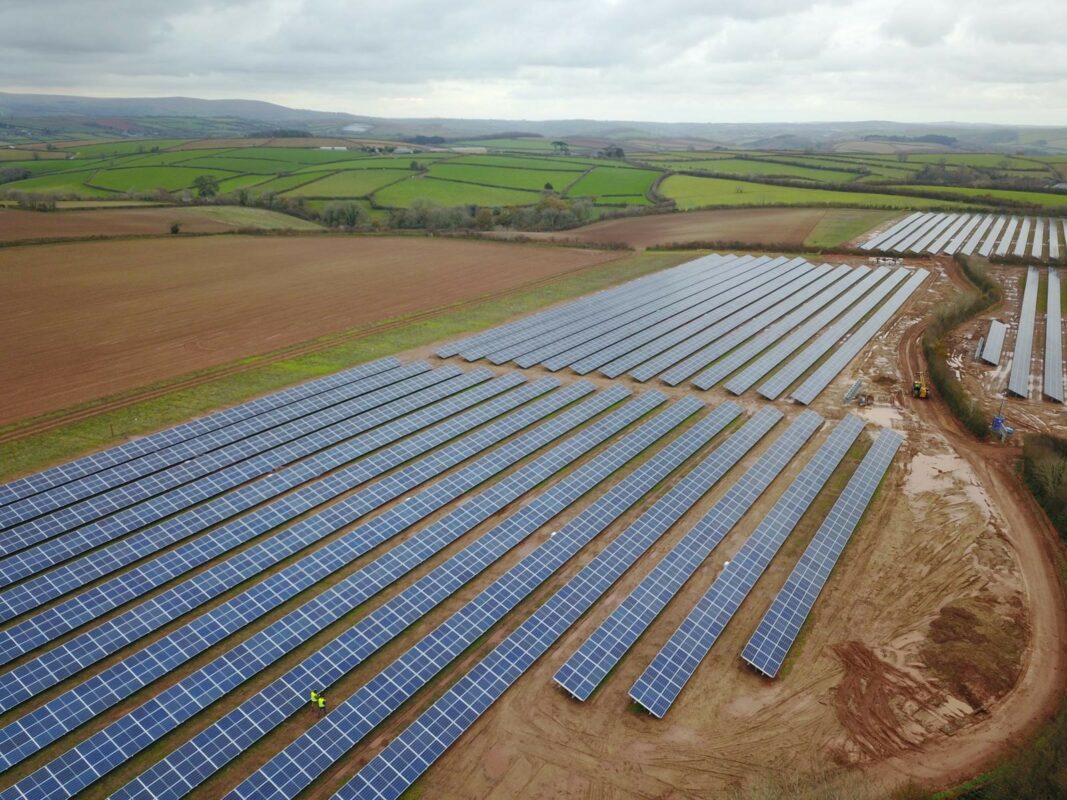
Creacombe solar farm in Devon, owned by community energy group CORE. Image: CORE.
Over the last few months, many community energy groups have been pulling together to help locals get through the challenges presented by COVID-19. But as the country starts to consider changes to the lockdown, new challenges for the industry and the people in it are likely to raise their heads.
Speaking to Solar Power Portal, Emma Bridge, CEO of Community Energy England, suggested the impact on community energy thus far had been largely similar to that on large companies. The forward facing side of operations has been hard hit, as has the of development of new projects.
Thankfully, community energy projects have been given a six month extension to complete and register feed-in tariff (FiT) projects, continued Bridge.
But despite the challenges, many groups have adapted to work for the benefit of their communities in a number of ways.
“Community energy groups are passionate about energy but also very much about tackling climate change, transforming places and building community resilience,” said Bridge. “So a lot of our members reacted really quickly when the pandemic started to spread, identifying ways that they could continue to support the community.”
In April, for example, six community-run solar farms advanced £195,000 in community benefit funds, with the money to go towards supporting their local communities during the COVID-19 pandemic.
Similarly, the Community for Renewables’ collective of four community energy enterprises mobilised £100,000 from surplus generation by community-owned solar projects, which was set aside for Corona Crisis Funds.
Elsewhere, groups like Brighton & Hove Energy Services Co-operative have been pulling together advice on energy supplier responses for prepaid meter customers during the pandemic, as Bridge explains.
“It is having that trusted voice that people who might struggle to know exactly how to get in touch with a supplier or who they need to go to for issues, they just have that helping hand there.”
Groups have worked to protect the future of the sector as well, such as the Community Energy Scheme giving its members a payment break for April, May and June, saving them over £200,000 in energy costs.
As the UK begins to look at lifting lockdown measures however, a new range of challenges are likely to present themselves.
Bridge echoed many in the energy sector, with hopes that the recovery can be used for the benefit of all in the UK.
“I think one of the most important things is around looking at how we build back better, how we use those positive examples of community led action and collaboration, to make sure that when we come out the other side, we've not just having a green recovery but it just recovery as well.”
Earlier in May, the Committee on Climate Change highlighted that the UK has a “golden chance” to place renewables at the heart of the COVID-19 recovery, in an open letter sent to the government.
Going forwards, community energy is likely to face many of the challenges other organisations are preparing for as the UK comes out of lockdown. But lessons have been learnt from the current crisis, for example taking advantage of digital tools to stay connected online.
“Being mainly volunteer led and spread across the country, it's also been quite hard to share learnings and work together, to aggregate and amalgamate our learning and our projects,” explained Bridge. “I think there will be a much greater focus on that going forward in terms of the virtual meetings and the virtual learning, and we're developing online resources to help with that as well.”
Beyond the workings of community energy groups, there could also be changes in the focus of projects.
Bridge continued: “I think a lot of the business models that are being explored by this sector are very similar to the rest of the energy sector. We’re looking at more smart tech and how to make current assets more efficient, integrating storage and looking at low carbon vehicle projects, and of course, heat as well. Those sorts of things are going to be very similar, the broader impact through recession will be the same.”
Community energy is seemingly in a strong position. In February two community groups CORE and YCE celebrated the first subsidy-free solar farm completion. Speaking to Solar Power Portal in April, YCE director Andrew Moore discussed how subsidy-free community solar was now just a matter of numbers, that had managed to add up for the pair.
“Community energy is relatively easy to understand, and it does inspire people to take wider action and behaviour change,” finished Bridge. “So I can see community energy being far more embedded into things like local authority, climate declarations, because at the moment, those things may not be quite as high profile because obviously there's more pressing immediate threats, but that work is still taking place.”

